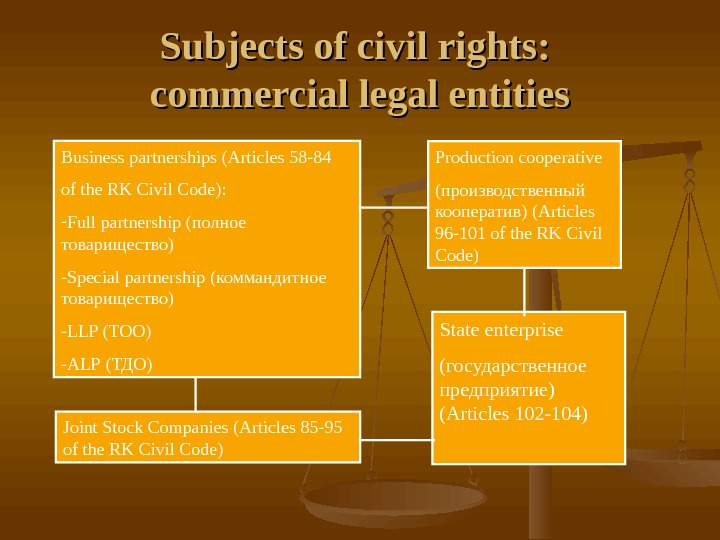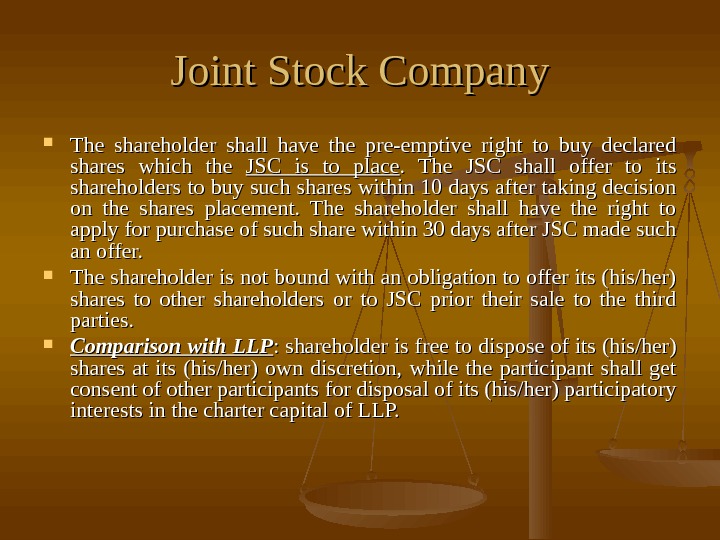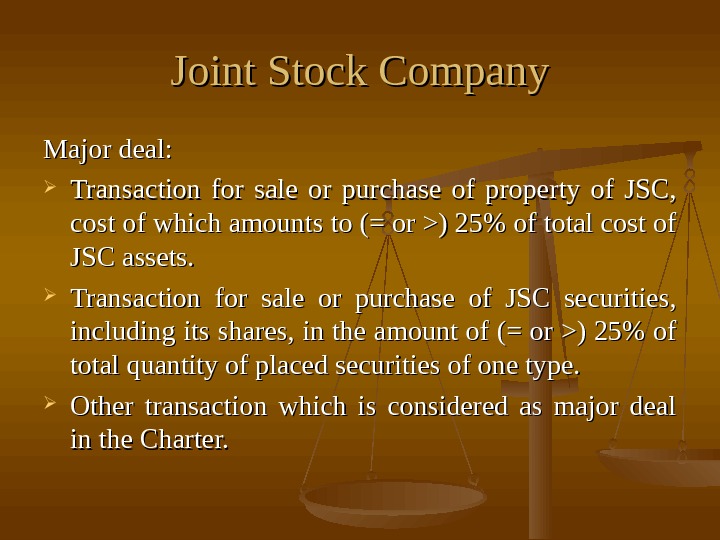CIVIL LAW Lecture 6 Subjects of civil














civil_law_subjects_of_civil_rights_lecture_6.ppt
- Размер: 95 Кб
- Количество слайдов: 14
Описание презентации CIVIL LAW Lecture 6 Subjects of civil по слайдам
 CIVIL LAW Lecture
CIVIL LAW Lecture
 Subjects of civil rights: commercial legal entities Business partnerships ( Articles 58 -84 of the RK Civil Code): — Full partnership ( полное товарищество) -Special partnership (коммандитное товарищество) — LLP ( ТОО) — ALP (ТДО ) Production cooperative ( производственный кооператив) (Articles 96 -101 of the RK Civil Code) Joint Stock Companies (Articles 85 -95 of the RK Civil Code) State enterprise ( государственное предприятие) ( Articles 102 -104)
Subjects of civil rights: commercial legal entities Business partnerships ( Articles 58 -84 of the RK Civil Code): — Full partnership ( полное товарищество) -Special partnership (коммандитное товарищество) — LLP ( ТОО) — ALP (ТДО ) Production cooperative ( производственный кооператив) (Articles 96 -101 of the RK Civil Code) Joint Stock Companies (Articles 85 -95 of the RK Civil Code) State enterprise ( государственное предприятие) ( Articles 102 -104)
 Joint Stock Company General Provisions: Shareholder is a person (physical or legal) who/which owns shares. Share is a security emitted by the JSC and confirming right to participate in management of JSC, to receive dividends on it and right to receive part of property of JSC after its liquidation, as well as other rights stipulated by laws. Voting shares are (a) placed ordinary shares; and (b) preferential shares with a right to vote in cases provided for by laws. Declared shares are shares, emission of which is registered by the competent body. Placed shares are shares of JSC paid out by the founders and investors at the initial securities market.
Joint Stock Company General Provisions: Shareholder is a person (physical or legal) who/which owns shares. Share is a security emitted by the JSC and confirming right to participate in management of JSC, to receive dividends on it and right to receive part of property of JSC after its liquidation, as well as other rights stipulated by laws. Voting shares are (a) placed ordinary shares; and (b) preferential shares with a right to vote in cases provided for by laws. Declared shares are shares, emission of which is registered by the competent body. Placed shares are shares of JSC paid out by the founders and investors at the initial securities market.
 Joint Stock Company JSC is a legal entity issuing shares with a view to attract funds for conducting its activities. JSC shall have its own property separate from the property of its shareholders, and shall not be liable for obligations of shareholders. Shareholder shall not be liable for obligations of JSC and shall bear risks of damages related to its activities only within the cost of shares belonged to the shareholder with exceptions provided for by laws. JSC shall be liable for its obligations by its property only.
Joint Stock Company JSC is a legal entity issuing shares with a view to attract funds for conducting its activities. JSC shall have its own property separate from the property of its shareholders, and shall not be liable for obligations of shareholders. Shareholder shall not be liable for obligations of JSC and shall bear risks of damages related to its activities only within the cost of shares belonged to the shareholder with exceptions provided for by laws. JSC shall be liable for its obligations by its property only.
 Joint Stock Company JSC can be organized by individuals and/or legal entities decided on its creation. JSC can be organized by one person (physical or legal). State bodies and state institutions can not be founders of JSC except the RK Government, local executive bodies and the RK National Bank. Founders of JSC shall be solidary responsible for expenses in connection with creation of JSC which may arise before its state registration. These expenses can be reimbursed by JSC only if they will be subsequently approved by the General Meeting of Shareholders of JSC can be created under decision of its founders (foundation meeting) or decision of its sole founder. Foundation documents of JSC are charter and foundation agreement, or charter and decision of its sole founder. Effect of foundation agreement (decision of sole founder) shall expire on a date of state registration of emission of declared shares. Foundation documents shall be notarized otherwise they will not have legal force.
Joint Stock Company JSC can be organized by individuals and/or legal entities decided on its creation. JSC can be organized by one person (physical or legal). State bodies and state institutions can not be founders of JSC except the RK Government, local executive bodies and the RK National Bank. Founders of JSC shall be solidary responsible for expenses in connection with creation of JSC which may arise before its state registration. These expenses can be reimbursed by JSC only if they will be subsequently approved by the General Meeting of Shareholders of JSC can be created under decision of its founders (foundation meeting) or decision of its sole founder. Foundation documents of JSC are charter and foundation agreement, or charter and decision of its sole founder. Effect of foundation agreement (decision of sole founder) shall expire on a date of state registration of emission of declared shares. Foundation documents shall be notarized otherwise they will not have legal force.
 Joint Stock Company Minimum size of Charter Capital of JSC shall be 50 000 monthly calculation indexes. Charter Capital of JSC shall be formed within 30 days after the state registration of JSC, by means of payment for shares by its founders under their nominal price and investors under their placed price, and shall be expressed in national currency of Kazakhstan. JSC is entitled to place its shares only after state registration of their emission within declared quantity of shares. System of list of shareholders of JSC (Article 19 of JSC Law).
Joint Stock Company Minimum size of Charter Capital of JSC shall be 50 000 monthly calculation indexes. Charter Capital of JSC shall be formed within 30 days after the state registration of JSC, by means of payment for shares by its founders under their nominal price and investors under their placed price, and shall be expressed in national currency of Kazakhstan. JSC is entitled to place its shares only after state registration of their emission within declared quantity of shares. System of list of shareholders of JSC (Article 19 of JSC Law).
 Joint Stock Company Types of shares Ordinary share shall give to its shareholder the right to participate in General Meeting of Shareholders with a right to vote under issues brought to voting, right to receive dividends if JSC has net incomes, and right to receive part of JSC property after its liquidation. Preferential share shall give to its shareholder the privileged right to receive guaranteed dividends and the right to receive property of JSC after its liquidation. Preferential share does not give the right to participate in management of JSC (non-voting share). Exclusion : Part 4 of Article 13 of JSC Law. Quantity of preferential shares shall not exceed 25% of total quantity of declared shares. Foundation Meeting or General Meeting of Shareholders can introduce GOLD SHARE , which shall not participate in charter capital and receipt of dividends, however, the holder of Gold Share shall have the right to ban any decision of General Meeting of Shareholders, Board of Directors or Executive body under certain issues stipulated by the Charter. The right of veto under the Gold Share shall not be transferred.
Joint Stock Company Types of shares Ordinary share shall give to its shareholder the right to participate in General Meeting of Shareholders with a right to vote under issues brought to voting, right to receive dividends if JSC has net incomes, and right to receive part of JSC property after its liquidation. Preferential share shall give to its shareholder the privileged right to receive guaranteed dividends and the right to receive property of JSC after its liquidation. Preferential share does not give the right to participate in management of JSC (non-voting share). Exclusion : Part 4 of Article 13 of JSC Law. Quantity of preferential shares shall not exceed 25% of total quantity of declared shares. Foundation Meeting or General Meeting of Shareholders can introduce GOLD SHARE , which shall not participate in charter capital and receipt of dividends, however, the holder of Gold Share shall have the right to ban any decision of General Meeting of Shareholders, Board of Directors or Executive body under certain issues stipulated by the Charter. The right of veto under the Gold Share shall not be transferred.
 Joint Stock Company The shareholder shall have the pre-emptive right to buy declared shares which the JSC is to place. The JSC shall offer to its shareholders to buy such shares within 10 days after taking decision on the shares placement. The shareholder shall have the right to apply for purchase of such share within 30 days after JSC made such an offer. The shareholder is not bound with an obligation to offer its (his/her) shares to other shareholders or to JSC prior their sale to the third parties. Comparison with LLP : shareholder is free to dispose of its (his/her) shares at its (his/her) own discretion, while the participant shall get consent of other participants for disposal of its (his/her) participatory interests in the charter capital of LLP.
Joint Stock Company The shareholder shall have the pre-emptive right to buy declared shares which the JSC is to place. The JSC shall offer to its shareholders to buy such shares within 10 days after taking decision on the shares placement. The shareholder shall have the right to apply for purchase of such share within 30 days after JSC made such an offer. The shareholder is not bound with an obligation to offer its (his/her) shares to other shareholders or to JSC prior their sale to the third parties. Comparison with LLP : shareholder is free to dispose of its (his/her) shares at its (his/her) own discretion, while the participant shall get consent of other participants for disposal of its (his/her) participatory interests in the charter capital of LLP.
 Joint Stock Company Management of the JSC Superior body Administration body Executive body General Meeting of Shareholders (all shareholders holding voting shares) or one shareholder Board of directors Collective body or sole body (President, General Director, etc. ) Other bodies Organized on the basis of laws and the Charter of JS
Joint Stock Company Management of the JSC Superior body Administration body Executive body General Meeting of Shareholders (all shareholders holding voting shares) or one shareholder Board of directors Collective body or sole body (President, General Director, etc. ) Other bodies Organized on the basis of laws and the Charter of JS
 Joint Stock Company JSC bodies: Superior body: Articles 35, 36, 37, 39, 52 of JSC Law. Administration body: Articles 53, 54, 56 of JSC Law. Executive body: Article 59, 60 of JSC Law.
Joint Stock Company JSC bodies: Superior body: Articles 35, 36, 37, 39, 52 of JSC Law. Administration body: Articles 53, 54, 56 of JSC Law. Executive body: Article 59, 60 of JSC Law.
 Joint Stock Company Major deal: Transaction for sale or purchase of property of JSC, cost of which amounts to (= or >) 25% of total cost of JSC assets. Transaction for sale or purchase of JSC securities, including its shares, in the amount of (= or >) 25% of total quantity of placed securities of one type. Other transaction which is considered as major deal in the Charter.
Joint Stock Company Major deal: Transaction for sale or purchase of property of JSC, cost of which amounts to (= or >) 25% of total cost of JSC assets. Transaction for sale or purchase of JSC securities, including its shares, in the amount of (= or >) 25% of total quantity of placed securities of one type. Other transaction which is considered as major deal in the Charter.
 Joint Stock Company Decision on major deal shall be adopted by the Board of Directors. For informational purposes the JSC shall, within 5 business days after adoption by the Board of Directors of the decision on entering into a major deal, publish in state and other languages via mass media a statement on the major deal. The Charter of JSC may provide for the list of major deals, which can be decided on only by the General Meeting of Shareholders. If shareholder does not agree with decision of JSC on major deal, the shareholder can demand that JSC buy out its (his/her) shares in order envisaged by laws.
Joint Stock Company Decision on major deal shall be adopted by the Board of Directors. For informational purposes the JSC shall, within 5 business days after adoption by the Board of Directors of the decision on entering into a major deal, publish in state and other languages via mass media a statement on the major deal. The Charter of JSC may provide for the list of major deals, which can be decided on only by the General Meeting of Shareholders. If shareholder does not agree with decision of JSC on major deal, the shareholder can demand that JSC buy out its (his/her) shares in order envisaged by laws.
 Joint Stock Company Liquidation of JSC can be Voluntary, under the decision of the General Meeting of the Shareholders Compulsory, under the court decision
Joint Stock Company Liquidation of JSC can be Voluntary, under the decision of the General Meeting of the Shareholders Compulsory, under the court decision
 Allocation of property of liquidating JSC between shareholders After satisfaction of creditors` claims the property of liquidating JSC shall be allocated by the liquidation committee among shareholders under the following turns: First turn: payments under the shares, which shall be bought out in accordance with JSC Law; Second turn: Payments under accrued ( начисленный) , but not paid dividends under the preferential shares; Third turn: payments under accrued, but not paid ordinary shares. The rest property shall be allocated between all shareholders proportionally the quantity of shares they hold.
Allocation of property of liquidating JSC between shareholders After satisfaction of creditors` claims the property of liquidating JSC shall be allocated by the liquidation committee among shareholders under the following turns: First turn: payments under the shares, which shall be bought out in accordance with JSC Law; Second turn: Payments under accrued ( начисленный) , but not paid dividends under the preferential shares; Third turn: payments under accrued, but not paid ordinary shares. The rest property shall be allocated between all shareholders proportionally the quantity of shares they hold.
